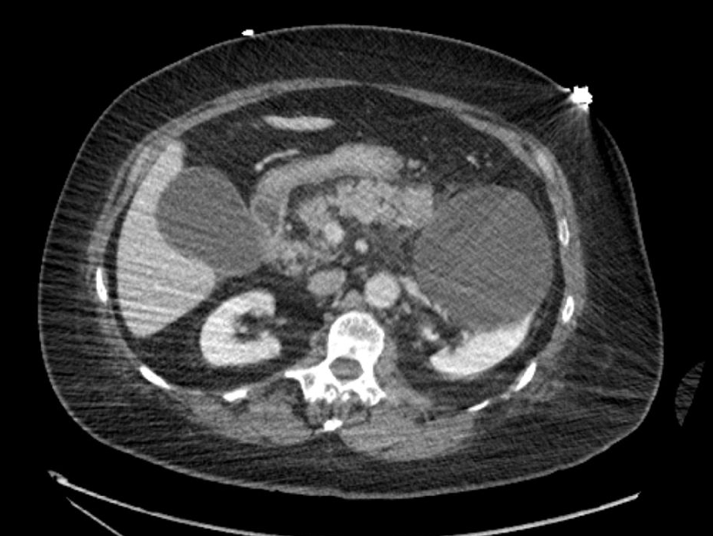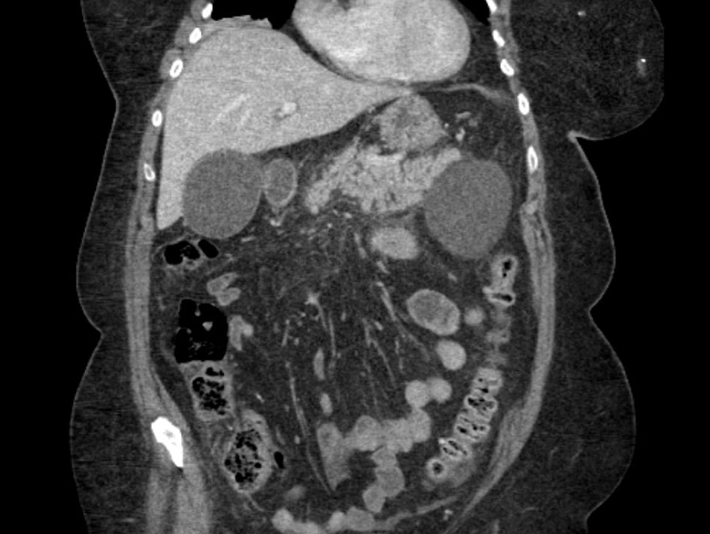Tuesday Poster Session
Category: Biliary/Pancreas
P4457 - Sweet but Not Innocent: A Case of D-Mannose and Amiodarone-Induced Pancreatitis
Tuesday, October 28, 2025
10:30 AM - 4:00 PM PDT
Location: Exhibit Hall
- KM
Kathleen S. Moore
Creighton University School of Medicine
Phoenix, Arizona
Presenting Author(s)
Vishnu Yanamaladoddi, MD, Ariana R. Tagliaferri, MD, Kathleen S. Moore, Vikash Kumar, MD, Shahab Aftahi, MD, BS
Creighton University School of Medicine, Phoenix, AZ
Introduction: Pancreatitis is commonly due to gallstones, alcohol use, hypertriglyceridemia, and vaping in young males. Medications such as antibiotics, statins, thiazides and herbal supplements are causative, and thus a thorough history is imperative. Amiodarone has been reported to cause pancreatitis via duct constriction, direct cellular toxicity and arteriolar thrombosis. However, D-Mannose, a herbal supplement used for urinary tract infection prophylaxis, has not been implicated in pancreatitis in humans. Herein we report the first case of D-Mannose induced pancreatitis, with a synergistic effect of amiodarone.
Case Description/
Methods: A 63-year-old woman with paroxysmal atrial fibrillation presented to the ER with acute epigastric pain, nausea and vomiting. She denied use of tobacco, marijuana, vaping, alcohol, illicit drugs, or recent antibiotics in the last 6 months. She took Eliquis and Rosuvastatin daily, unchanged for many years. On arrival, she was afebrile and hemodynamically stable. She had severe epigastric pain on exam without peritonitis and labs were significant for a mild leukocytosis (10K) and elevated lipase (10,331). CMP, IgG4 1-4, and triglyceride levels were normal. An abdominal US was unremarkable. CT revealed acute interstitial pancreatitis. She improved following intravenous hydration. 4 months later, she presented with atrial fibrillation and RVR, unresponsive to diltiazem for which she required amiodarone. Two days following her discharge, she returned with recurrent pancreatitis (lipase 3,309) with non-contributory labs and imaging including MRCP. A more thorough medical reconciliation at this time unveiled use of D-Mannose for recurrent UTI’s, over the last year. Once the supplement was discontinued, the patient’s symptoms resolved and no further admissions were required.
Discussion: While there are no human studies, there have been studies in mouse models illustrating how disruption of the mannose-6-phosphate dependent pathways in the enzyme trafficking system leads to pancreatitis. As mannose-6-phosphate assists digestive enzymes, deficiencies may lead to deranged pancreatic metabolism. D-mannose was consistently used prior to and during subsequent episodes of pancreatitis,which resolved following withdrawal of the agent. It is likely, use of amiodarone exacerbated her pancreatitis due to accumulation in the pancreas leading to synergy. This case highlights the importance of considering uncommon causes and underscores the need for a meticulous medication reconciliation.

Figure: Axial view of CT abdomen/pelvis showing acute interstitial edematous pancreatitis, a mildly hydropic gallbladder, small bilateral pleural effusions and sigmoid colon diverticulosis without diverticulitis and a stable renal cyst

Figure: Coronal view of CT abdomen/pelvis showing acute interstitial edematous pancreatitis
Disclosures:
Vishnu Yanamaladoddi indicated no relevant financial relationships.
Ariana Tagliaferri indicated no relevant financial relationships.
Kathleen Moore indicated no relevant financial relationships.
Vikash Kumar indicated no relevant financial relationships.
Shahab Aftahi indicated no relevant financial relationships.
Vishnu Yanamaladoddi, MD, Ariana R. Tagliaferri, MD, Kathleen S. Moore, Vikash Kumar, MD, Shahab Aftahi, MD, BS. P4457 - Sweet but Not Innocent: A Case of D-Mannose and Amiodarone-Induced Pancreatitis, ACG 2025 Annual Scientific Meeting Abstracts. Phoenix, AZ: American College of Gastroenterology.
Creighton University School of Medicine, Phoenix, AZ
Introduction: Pancreatitis is commonly due to gallstones, alcohol use, hypertriglyceridemia, and vaping in young males. Medications such as antibiotics, statins, thiazides and herbal supplements are causative, and thus a thorough history is imperative. Amiodarone has been reported to cause pancreatitis via duct constriction, direct cellular toxicity and arteriolar thrombosis. However, D-Mannose, a herbal supplement used for urinary tract infection prophylaxis, has not been implicated in pancreatitis in humans. Herein we report the first case of D-Mannose induced pancreatitis, with a synergistic effect of amiodarone.
Case Description/
Methods: A 63-year-old woman with paroxysmal atrial fibrillation presented to the ER with acute epigastric pain, nausea and vomiting. She denied use of tobacco, marijuana, vaping, alcohol, illicit drugs, or recent antibiotics in the last 6 months. She took Eliquis and Rosuvastatin daily, unchanged for many years. On arrival, she was afebrile and hemodynamically stable. She had severe epigastric pain on exam without peritonitis and labs were significant for a mild leukocytosis (10K) and elevated lipase (10,331). CMP, IgG4 1-4, and triglyceride levels were normal. An abdominal US was unremarkable. CT revealed acute interstitial pancreatitis. She improved following intravenous hydration. 4 months later, she presented with atrial fibrillation and RVR, unresponsive to diltiazem for which she required amiodarone. Two days following her discharge, she returned with recurrent pancreatitis (lipase 3,309) with non-contributory labs and imaging including MRCP. A more thorough medical reconciliation at this time unveiled use of D-Mannose for recurrent UTI’s, over the last year. Once the supplement was discontinued, the patient’s symptoms resolved and no further admissions were required.
Discussion: While there are no human studies, there have been studies in mouse models illustrating how disruption of the mannose-6-phosphate dependent pathways in the enzyme trafficking system leads to pancreatitis. As mannose-6-phosphate assists digestive enzymes, deficiencies may lead to deranged pancreatic metabolism. D-mannose was consistently used prior to and during subsequent episodes of pancreatitis,which resolved following withdrawal of the agent. It is likely, use of amiodarone exacerbated her pancreatitis due to accumulation in the pancreas leading to synergy. This case highlights the importance of considering uncommon causes and underscores the need for a meticulous medication reconciliation.

Figure: Axial view of CT abdomen/pelvis showing acute interstitial edematous pancreatitis, a mildly hydropic gallbladder, small bilateral pleural effusions and sigmoid colon diverticulosis without diverticulitis and a stable renal cyst

Figure: Coronal view of CT abdomen/pelvis showing acute interstitial edematous pancreatitis
Disclosures:
Vishnu Yanamaladoddi indicated no relevant financial relationships.
Ariana Tagliaferri indicated no relevant financial relationships.
Kathleen Moore indicated no relevant financial relationships.
Vikash Kumar indicated no relevant financial relationships.
Shahab Aftahi indicated no relevant financial relationships.
Vishnu Yanamaladoddi, MD, Ariana R. Tagliaferri, MD, Kathleen S. Moore, Vikash Kumar, MD, Shahab Aftahi, MD, BS. P4457 - Sweet but Not Innocent: A Case of D-Mannose and Amiodarone-Induced Pancreatitis, ACG 2025 Annual Scientific Meeting Abstracts. Phoenix, AZ: American College of Gastroenterology.
